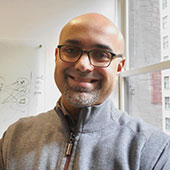Embracing Artificial Intelligence and Automation
Naveed Asem’s new MSIT mini-course will unveil how to responsibly shape the future with emerging technology.
Naveed Asem said the emergence of artificial intelligence (AI) has put humanity at a crossroads. In his opinion, those who embrace AI now will thrive in the future; people who don't take it seriously will be left behind.
“Imagine if your parents rejected cellphones and wanted to stick to a landline forever, life would be completely different for them, and you," said Asem, an adjunct lecturer and Industry Advisory Board member for Northwestern Engineering's Master of Science in Information Technology (MSIT) program. "I believe that people who refuse to understand and use AI will fall in that same category. Their life will be non-functional in just a decade."
 Asem (MSIT '14) is driven to help current MSIT students prepare for a future with AI.
Asem (MSIT '14) is driven to help current MSIT students prepare for a future with AI.
Asem is teaching a new, five-week course this spring that expands on a one-day seminar he previously delivered as part of MSIT's capstone course. The goal of Artificial Intelligence and Automation is to demystify AI and showcase it as an attainable, practical reality.
“Once you understand how AI works, only then can you start thinking about how to drive value out of it for your business,” he said.
As head of global analytics and insights for the tax-compliance software and automation company Avalara, Asem is using AI to drive more accurate business forecasting and to identify what products sales representatives should recommend to customers.
“People think AI is this complex thing, but under the hood, it's a fairly easy thing to build,” he said. “The hardest part is to identify the right problem to solve and to use the right technique to solve it.”
Students in the new course will focus on identifying those problems and learning how to do the basic coding of an AI bot to perform an automated task.
Asem has lofty visions for what AI can do in the near future by predicting human behavior to avoid unnecessary power generation, foreseeing diseases and boosting preventative health care measures, fighting poverty, improving businesses’ financial forecasting, and tackling crime by addressing its precursors or by distributing police resources ahead of predicted problems.
He also understands why some might be intimidated by those visions.
“With great power comes great responsibility," he said, "and with great power sometimes also comes a very evil intent.
“When we think about the impact of AI and automation, we must also think about how technology can be used in a malicious way and how to prevent that.”
Being able to do that is one thing that will help MSIT students stand out.
“The goal is for the MSIT students not to feel like AI is this complex thing they can’t understand,” Asem said. “My mission is to make AI as easy as using Excel to do simple table calculations.”

